The Indonesia expat reference thread
Last activity 20 November 2024 by ginasmailnc
27106 Views
171 replies
Subscribe to the topic
Post new topic

Not strictly an expat related topic, but many expats start their Indonesian adventure with a holiday, and the thread has a lot of handy tips for new expats.
General information and suggestions
Renting a motorbike
Hotels
Dangerous alcohol
Illegal drugs
Smartphone
General points
Never leave your passport with anyone for any reason.
Hotels should photocopy and return it
Keep it light, preferably hand luggage size; saves a ton of messing around at airports.
Pack simple (I know this is harder for girls).
2 pairs of very lightweight trousers.
A bunch of T shirts (It gets hot here so you'll find yourself using at least two per day)
One polo shirt (You'll need this if you visit immigration/other offices as you may not be allowed in without a shirt with a collar and long trousers)
Underwear/socks
I also carry a thermal shirt for colder areas/use on buses and trains (They're totally mad with the air conditioning)
A waterproof coat (Also handy if you're returning home to a cold country/going to cold areas of Indonesia)
A folding baseball cap (The sun kills me if I don't use one)
A pack of wet wipes (Don't ask, just thank me later)
Another pack of wet wipes - Many washrooms don't have soap.
A microfiber towel
A couple of black bin liners - when you first visit a bus rest stop toilet/washroom, you'll understand. The floor are often soaking wet and there's rarely anywhere to hang your bag/clothes.
A super light sleeping bag - make it yourself.
Take a piece of thin cotton material, at least one meter wide and two and a half times your height.
Sew it to turn it into a long bag, open at one end only.
Many budget hotels have no bed sheets but they do have free biting insects - sleep in that and you'll save yourself a world of grief.
I still carry mine when I wander.
Tip - squirt insect repellent on the outside at the open end and the ants won't walk inside.
Tip - This can also be used as a wrap to keep you warm on buses and trains.
When you arrive, go directly to Alfamart and buy:
a folding travel toothbrush (Rp10,00)
Small sachets of shampoo (About Rp1,00/each)
a bar of soap (Rp 3,000)
Many budget hotels don't provide these.
Suncream (if required)
Small sachets or a small tube of insect repellent (you'll need those at night)
Pack that lot into a light rucksack (without a frame), and you're good for a week or more.
Laundry in the most expensive places is Rp10,000/kg for next day service.
Use a waist hidden wallet for your passport, all your credit cards and larger amounts of cash, leaving only a smaller amount for daily use.
I use a neck wallet for that as it's very easy to get to but hard to steal from without you noticing.
Careful on buses and trains - keep your stuff close and cash out of sight. When the bus stops for a break - take your stuff with you.
I always book two seats on the bus - that way you can stretch out or even lie down on the seat; your soft backpack is handy as a pillow.
Always use an air conditioned bus. If it gets too cold, use the home made sleeping bag to stay warm.
Cross country train seats are wide - one is fine. If you are able to afford VIP train tickets - they are pretty great for long journeys.
In most of Indonesia, air conditioned rooms are best, but you won't need hot water.
In cold areas (Such as Wonosobo), you won't need the air con but hot water is a serious bonus.
Renting a motorbike for your holiday
Many companies sell this idea, and some expat publications push it, but you have to be very careful.
A few main issues come to mind:
It's very likely to be illegal as most western licences are not valid in Indonesia
If you have an accident it's probably your fault regardless of what happened, especially if you don't have a valid licence.
An accident causing serious injury to anyone is likely to get very expensive as your insurance might not cover you if you were driving illegally. Don't even think about an accident that causes death.
Driving while drunk is not illegal but not being in control of the vehicle is, and that's taken seriously if you have a crash.
My odd visits to Indonesian prisons was easily enough to strongly suggest you don't do anything to be a resident in one.
Your holiday medical insurance may not cover injuries from a motorcycle crash if you were riding illegally.
HOTELS
Reviews of a few hotels can be found here.
https://www.expat.com/forum/viewtopic.p … 28#3282278
Unmarried couples living together can, on rare occasions, face problems.
I saw a couple, Indonesian man with foreign girlfriend check into a hotel, the policeman I was with asked me if I thought they were married.
I asked him if he really wanted to know the answer.
The police (in general) aren't interested in upsetting tourists but it's something to keep in mind.
The much talked about law about unmarried couple getting arrested for staying in a hotel room never happened so ignore the stories.
On another occasion, after a very long hard trip, we checked into the first hotel we saw, intending to move the next day when we weren't so tired.
About midnight, the Sat PP were hammering at a the door, looking for men with prostitutes.
When he saw my kid in bed with us, he buggered off, all apologetic.
However, I wandered out and noticed a lot of empty rooms with the doors left open.
I suspect that trade was common in that hotel.
The moral of the story is, single men don't bother, and everyone else be a little careful as to the hotel you choose.
Most hotels ask you to leave a form of identification when you check in, but I would strongly advise you not to leave your passport as they are of great value on the black market.
For tourists, I strongly suggest keeping your passport hidden away and giving a photocopy to the hotel.
No one has ever asked me for a credit card when booking a room.
Added - I've stayed in a wide variety of hotel rooms from very basic backpacker style to several of the very nice Aston hotels (and they are very, very nice - terrific breakfasts - I strongly recommend Aston hotels).
If you're out and about, google maps will display all local hotels for you, and link directly to booking sites, usually listing the price offered by each one.
Be careful of booking apps. I've had a couple of bad experiences with the one that commonly shows up as the cheapest. The prices at least one app, the first in the alphabet, are never the price you actually pay and not by just a little bit. NEVER leave your card deals on sites as there are concerns, one app taking money from my card AFTER I'd deleted the card from their site. In other words, there are concerns about the honesty of at least one of them
Alcohol - Advice that could save your life.
Alcohol is quite expensive in Indonesia but don't let that tempt you into buying cheap stuff from local shops.
The chains, Alfamart, Indomaret, and so on, are no longer legal outlets - I can't remember the last time I saw any in a supermarket. I think there may be places in Bali, but you'll have to check with locals about that.
Many hotels, especially expensive places, have a bar.
Some areas now have a total ban on alcohol sales. Whilst this is often unpopular with expats, it's very popular with most locals (or they simply don't care) as they don't drink anyway.
Many small shops sell cheap gin, whisky or whatever but the stuff is laced with methanol, bleach and various other nasties that'll likely put you in hospital or a morgue.
Locals sometimes die of it as two lads in Wonosobo did when I lived there but it's also been known to kill tourists.
http://www.dailymail.co.uk/news/article … drink.html
The father of a young British backpacker who died after drinking poisonous gin has flown around the world in a bid to catch the people who sold her the lethal substance.
Brenton Emmons, 47, has travelled more than 8,000 miles to Indonesia after his daughter, Cheznye, tragically died there in April.
This stuff is common all over Indonesia so, to be safe, NEVER buy alcoholic drinks except in legal outlets.
indostocks wrote:RE: Alcohol consumption. Very good advice, Mas Fred!
Just my extra 2 sen...
Western spirit are extremely expensive in Indonesia so if you can find a local source for safe alcohol then treat them well. Manado and environs are sources for palm wine. Flores and the Batak region of Northern Sumatra are also places where locally sourced distillates can be encountered.
Again unless you are buying properly sealed western liquor or beer make sure of your source.
I live in Yogyakarta so I don't drink except for the occasional can or bottle of San Miguel.
Ubudian wrote:Booze in Bali:
Locally made arak is the high octane spirit of choice among the Balinese, and it is indeed potent. Various arak cocktails are served in many bars and restaurants, arak madu being probably the most popular. Arak madu is made with honey and lemon and its quite good.
Most Balinese will agree that the very best arak is made in the Amed, East Bali area. It is illegal to produce it without a license, but bootlegging is popular here and thus you can find arak at a great many warungs being sold in re-cycled glass bottles.
As previously mentioned, local made stuff is always a drink at your own risk proposition and there are periodic articles in the local papers of a local dying from consuming poisoned arak. Some idiots think that adding ground down mosquito coils to the arak increases its potency even more.
There is a licensed local distillery operation in Bali called Bali Moon. They recently came out with a very high quality vodka which rivals the best and in taste competitions regularly beats Stoli, Absolute and Sky. Its called Bali 9not after the famed criminals in our prison, but rather to reflect the number of times it is charcoal filtered. Retail runs about 180k for a 700 ml bottle and I think its only available now on Bali and nowhere on Javabut I could be wrong on that as their intention is to market this in Java eventually.
Bali is also home to a great micro-brewery called Storm Beer. This is a great quality brewery and they produce five varieties from a hearty stout to a light pale ale. They are having some problems as of late and production recently stopped. Hopefully their issues will be resolved soon and production resumed as it is the best beer available on Baliall imports included.
Illegal drugs
A few grams of weed can get you five years in a very nasty prison
A small amount of a class A drug can get you in front of a firing squad
DON'T BRING RECREATIONAL DRUGS INTO INDONESIA

Paperwork
Visa on arrival
KITAP for expats married to an Indonesian
KITAS/KITAP - Changing address, passport or other details
Identity and family cards (KTP WNA, SKTT, KK)
Working in Indonesia (KITAS/IMTA)
Working as an English teacher
Retirement visa
Application for Indonesian citizenship
Pets to Indonesia
Paperwork
KEEP EVERYTHING - SCAN EVERYTHING
You'll find Indonesian officials require a lot of paperwork of all sorts to produce pretty much any sort of document, sometimes even asking for very old stuff as has happened to me on several occasions.
1 - Keep every bit of paperwork you ever get from anyone.
2 - Copy any paperwork you're given to pass on to any other office, even if you don't need it.
3 - Scan everything and keep copies on several disks to back them up. I also keep a copy of everything on my phone so I have it with me at all times - That can be handy from time to time, especially as you can bluetooth them to an official's computer and he can print them out.
4 - Keep at least one set of all the main documents in a folder (With 2 sets of photocopies) and take them to every meeting where you think you might be asked for anything.
5 - Scan your passport and all immigration stamps and any permits (KITAS KITAP and so on).
5 - Keep copies of all police reports and scan them. These will only be needed in unusual times but they can prove handy to have available
6 - Make colour copies of the required documents. They can be simple photocopies but colour tends to be well received and that can help in difficult situations.
The paper trail for most official stuff in Indonesia has been smoothed out a lot. These are still around and it's advisable to give copies of everything to your local RT, but they have been bypassed for a lot of stuff now.
RT - The local head of your street or small area
RW - The head of the RTs
Kelurahan - The office that looks after all the stuff from the Rws
Kacamatan - The office that looks after all the stuff from the Kelurahan
Catatan sipil - Office of civil registration
Long, hard, the RT/RW are often part time and work so can be hard to get hold of.
If you live in larger towns/cities, get to offices thirty minutes before they open and make sure you stand in front of the door so you're first. Two minutes after opening there will be 50 or more people ahead of you.
Always turn up to any office reasonably dressed. For men, that means long trousers, shoes and a shirt with a collar (Polo shirt works).
Ladies, a skirt or dress below the knee and no plunging tops.
You're likely to be refused service if you turn up in shorts and a T shirt.
It's not uncommon for your local RT or RW to offer to do all the work for you (For a price) - This isn't illegal as long as they don't offer you any ways around the law, just sticking to ways around the messing about and queues.
This is more likely to be offered in smaller towns and villages where people tend to lack money.
As I dislike messing around, I generally took them up on the offer when I lived around Jakarta, but I do it all myself now..
Most of the corruption has been cleared up now so don't attempt to offer a bribe.
Doing so is likely to cause a lot of problems for you.
However, a 'Thank you' when everything has been completed is ok.
Visa on arrival - COVID has really hit regulations so check with your nearest Indonesian embassy before booking a flight
********************************
DO NOT BRING RECREATIONAL DRUGS INTO INDONESIA - A LONG PRISON TERM AND/OR A FIRING SQUAD AWAIT YOU
********************************
Citizens of many countries can enjoy a free visa on arrival in Indonesia, that list and a wealth of other information is HERE
Most VOA applicants are just 'rubber stamped' and welcomed to Indonesia but there can be problems:
Turning up drunk at the airport
Wearing 'disrespectful' clothes
Too many VOAs with little or no time between them
Your passport has less than six months validity
You don't have a ticket to leave Indonesia (Rarely asked for in normal circumstances)
Clothes don't need to be your best suit or dress, just looking decent and reasonable. Officers are used to backpackers and businessmen and they let pretty much everyone through without a problem, but there can be issues if you don't follow reasonable norms.
A free VOA is valid for 30 days (not a month) and can't be extended.
Overstaying a day or two is quite common, and usually the result of a mistake in checking dates, so these are generally treated with a small fine and not much more.
Serious overstays are much more of an issue and can lead to very large fines, blacklisting, and/or worse.
If in dispute with an immigration officer, NEVER raise your voice or act threatening in any way.
KITAP for expats married to an Indonesian
After two spouse sponsored KITAS, an expat married to an Indonesian is allowed to apply for a KITAP (Five year immigration document).
This allows freedom to do some casual work or work in a family business.
The law is a little contradictory, so better to be safe and not take up full time employment without an IMTA work permit.
However, this spouse sponsored KITAP is usable as an immigration document for work in Indonesia.
Most expats married to an Indonesian citizen AND have held two KITAS temporary stay permits have an easy run to get a KITAP but immigration may require proof you have sufficient funds to remain in Indonesia without working, or enough so casual work is adequate to meet your needs.
If you have a work permit, that won't happen.
NOTES
All KITAP holders should get a KPT WNA (or KTP OA, as some refer to it)
The old police registration (SKLD) is no longer required for foreigners in Indonesia.
KITAS / KITAP - Change of details.
In the days of the blue book, if you changed address, you simply took a letter from Pak RT and your blue book to immigration. Job done.
The demise of the blue book has changed things so now you must have:
Copy of your KITAS/KITAP
Original KITAS/KITAP
A request/permission letter from your sponsor
A letter from the local village office (Surat domicili)
A red folder (From immigration - free of charge)
Two forms (From immigration - free of charge)
Your passport
A copy of your passport
If immigration ask for other documents, smile and get them.
Moving house within an immigration AND local administration area is simple enough, a letter from your local PAK RT/RW usually being fine but, if you move outside either an immigration area or local administration area, you need much more.
-----------------------------------------------------------------------------
Changing passport whilst on a KITAS/P
If you change your passport whilst on KITAS/P, you must inform immigration.
Take with you:
Original KITAS/KITAP
Copy of your KITAS/KITAP
A letter from your sponsor
Old passport
New passport
Photocopies of ID pages of old and new passport
Photocopy of relevant visa page of old passport
The required form can be obtained from immigration free of charge, along with the red folder you must put it in.
Identity card (KTP/SKTT) / Family card (KK)
SKTT and KTP WNA ID cards are available with some messing about, but no one ever tells you the law.
The fines for not having one are minor, but I've heard of people spending a night in the cells whilst waiting to sort out the problem.
KITAP holders should also have a KK (Family card).
Foreigners on a KITAS are required to get an SKTT.
Foreigners on a KITAP are required to get a KTP WNA.
NOTE - The residency card (KTP or SKTT) MUST be carried at all times or you could be subject to arrest.
The fines are small as this is considered to be a minor crime, but you could end up with a night in a cell whilst it's sorted out, followed by a small fine.
The requirement for a police ID card (SKLD) were dropped some years ago, so you can forget that one. A lot of sites still list this as a requirement, but just ignore it
The process is simple, but can be a real pain to get through.
Most of the problem is the local government officials are commonly unfamiliar with the law on this matter, assuming that foreigners can't appear on the family card.
A KITAP holder should appear on his or her family card along with the rest of the family but it's not uncommon to have a separate one for the foreigner. I never managed to get on mine until I became Indonesian. No real problem if you don't manage.
A foreigner KTP is pretty much understood by most offices now.
Whatever happens, ALWAYS remain polite. The first angry word is very likely to mess you up until you move house, so don't bother trying.
The whole process should take about two weeks max, probably less.
Working in Indonesia
ASEAN country citizens have some freedom to work here if they are in given professions, but restrictions still apply.
To work, you need to get a work permit (IMTA) and a visa (ITAS or ITAP).
To get a work permit, you MUST have a skill that is not available locally.
This does not include lifeguard, cook, waiters, massage parlour workers and/or other unskilled work.
Be aware, the penalties for working illegally can include, fines, prison time, and deportation.
YOUR DREAM OF WORKING AS A LIFEGUARD OR A HAIRDRESSER ON BALI IS JUST A DREAM - FORGET IT.
The law is designed to protect jobs for Indonesians, nothing else.
A spouse sponsored KITAP holder is allowed to work informally without a work permit, part time and without contract. Working in your spouse's business is fine.
Holders of this immigration document are restricted (according to the work department but argued about a lot) from formal work.
KITAS (immigration document) and IMTA (Work permit) should be dealt with by your employer at no cost to you.
This means you should take the contract seriously, noting you might well be asked to pay fees if you resign before the contract period.
You should have an exit permit to leave the country, and it's your employer who deals with that, so no thinking about running away.
As for two year contracts - don't.
The company only gets a one year work permit, so the common reason they want you to stay is they have a high staff turnover.
Take that as you wish, but there is no way I'd sign a 2 year contract without a very special reason.
Your employer will ask you for a lot of documents but apart from signing letters and the identification process, your employer does all the work at no cost to you.
The employer is also responsible for your flight tickets.
Working as an English teacher.
There are a lot of schools wanting to hire 'native' English speakers.
These range from the language mills, many offering poor salary and lousy working hours, to top quality international establishments, offering massive salaries and very nice working conditions.
Real schools generally offer from Rp20,000,000 upwards.
To be legal, the school should provide the work permit and KITAS (immigration document) and you have to be from any one of five countries.
UK, USA, Canada, Australia, and New Zealand
As with every work permit/KITAS I've heard of, you MUST get an exit permit.
You can't get that unless the school signs it off.
The moral here, don't bug your boss and don't bother trying to do a runner, the airport immigration will turn you back.
lukereg wrote:Working in a 'language mill' ish Fred has pretty much hit all nails on the head. There are however exceptions to the rules for western teachers it being Indonesia. But degree qualified, drug and hiv free reachers are now expected norms and my company English First is now also expecting every new teacher to provide background checks before coming here which is a first for Indonesia.
Whilst that sounds strict or over the top I see an end to the days of back packer teachers and the dawn of a more professional level and approach to teaching English here. After 6 years in this industry I can say I am seeing it change constantly for the better.
A note from a friend on this subject.........
Here are the latest requirements for a teacher who wants to work for a private school and there is no guarantee that a visa will be issued anyway. There is also a requirement for a full health (physical and mental) check, HIV and drug check as well as background checks. Bear in mind this is for a 1 year job which is 50% less a month than in China, so I am sure you will agree that private schools are on the decline and I cant say how long this will last. I am sure there will be a relaxation with these rules again this year but I cant say when. You should also know that these rules also effect everyone here as well at the moment. Needless to say, I am not in a comfortable position.
Current Visa Requirements
Citizen of Australia, Canada, New Zealand, UK or USA
Over 25
BA degree holder with any major
TEFL certification
5 years of teaching experience after BA awarded
It should be noted many employers don't ask for the five years experience.
These rules are known to be flexible - no idea how, but they can be 'massaged' - I wouldn't recommend it in case you get caught up in something illegal.
Retirement visa.
Please check this information as I have not updated it for a while. See it as a guide, not absolute fact
These are done through a travel agent, and must be collected from outside Indonesia, although there's nothing stopping you applying whilst you're in the country on a tourist visa.
Any Indonesian can sponsor a retiree as a spouse, and without the restrictions placed upon retirement visa applicants.
INCOMPLETE LIST - MORE TO COME
You need to be a minimum age of 55 at the time of application.
Application form and guarantee from sponsor (An approved travel agent)
Copy of Business License (SIUP) of the sponsoring travel agent.
Copy of Taxpayer Identification Number of the sponsoring travel agent.
Statement of pension funds or Bank statement from the country of origin showing a minimal income of $ 2,500 per month
Health, death, and third party liability insurance.
Photocopy of marriage certificate (If applicable)
Colour photocopy of passport.
(The passport must be valid for at least 18 months)
Statement letter to show the rent of accommodation
Statement you will hire a local maid
Application for Indonesian citizenship
This is possible for some expats but isn't an easy or simple process.
Citizenship is a major change with advantages and disadvantages, not something you should or can do on a whim, and definitely not to be done so you can buy a holiday home on Bali .
To gain Indonesian citizenship you must have a minimum of five years continuous legal living in Indonesia or ten years on and off whilst holding a KITAS or KITAP.
You must have no criminal record that left you with more than one year in prison. NO drug use at all as that sort of stuff will immediately kill your application.
It's easier and much faster for people married to Indonesians.
Expect the process to take around two years, more if not married to an Indonesian.
You MUST give up your original nationality before the citizenship is confirmed. This must be in writing from your previous government.
The whole process is in Indonesian - If you can manage that, you have sufficient skill in that language. There is no formal language test as such but the final stage is mostly interviews so, if you can't manage the answers in Indonesian, you're unable to get past those.
Questions vary a lot but there are several panels of people including immigration, senior police offices, people from Hukum HAM and several others including doctors that check your health record.
You move to a new set of interviewers as they become free to speak to you.
The interviews are the final stage in a very long and careful process that includes a lot of home visits from various people and a lot of checking up on the applicant. Questions vary a lot but you should know the national anthem, Pancasila, UUD 1945 and what all these mean to Indonesia as a country and life here.
The long and the short is, apart from the set requirements, you have to prove you're likely to be a good Indonesian, not just using the passport as an easy way to buy a villa in Bali but really live in Australia or where ever.
Your old passport is kept by you but the corner is cut and it's cancelled electronically meaning it's just a worthless book but serves as proof the passport is no longer valid. Immigration will require that as part but not all of the proof you have renounced your citizenship of whatever country.
Pets to Indonesia
It is possible to get pets into Indonesia but NOT to some areas. The most asked is dogs to Bali.
Forget it, it's as illegal as it is dangerous.
Breaking the law by trying to get your pet onto the island might well see the animal put down, and you in very serious trouble with the possibility of deportation.
https://kemlu.go.id/sydney/en/pages/baw … ut-service
It is illegal to bring pets (dogs, monkeys, cats, and other such animals) into the following rabies-free areas and provinces:
Madura, Bali, Nusa Tenggara Barat, Nusa Tenggara Timur, Maluku, Irian Jaya, Kalimantan Barat, all islands included in the Sumatran area
Internet.
Much of Indonesia had internet that could be described as, Poor, slow, terrible, or even, a waste of time but the situation is improving rapidly, most populated places having reasonable connection speeds, some suppliers offering very fast internet.
Several providers are offering faster speeds with little or no price increase, mobile 4G being available over much of the country.
5G is rolling out, and more suppliers are offering massive or unlimited data packages at very reasonable prices.
Home internet is available from a wide selection of suppliers but you'll find not many places outside large towns and cities offer two options on the same street. Some wireless suppliers have home wifi modems that give you very reasonable speeds.
Fast fibre optic connections are now very common.
Mobile internet is available from all operators but you will want to check coverage areas before you buy a SIM card. These SIM cards can also be used in portable wifi modems.
Telkomsel probably have the best coverage but other suppliers rival them and may be cheaper.
If your internet use is emails, news and a bit of minor browsing, one of the mobile packages with a few gigabytes per month quota is likely to be your best option. These small, portable wifi units are tiny so easily fit in your pocket to use at home, the office, or pretty much anywhere else.
Units can be purchased from internet service providers or bought separately so any SIM card can be used. If you do that, make sure the modem will handle 4G.
My SIM cards are now with Smartfren. I have one for my main phone, and a portable wifi unit I use with my tablets and computers.
Both have a massive package that was very cheap. The upshot is I never have to care about data when out and about.
You can choose your number from a wide selection with these packages.
If you like the idea, check Smartfren has decent coverage in your area.
You might want to note, Indonesia has 'internet sahat' (Healthy internet) that restricts a lot of sites, these mostly being extremist stuff, porn and some way out on the edge political stuff, but some normal sites get caught up in this for no apparent reason.
Extremely important - Indonesia has extremely harsh defamation laws and the same level of seriousness on electronic communications that break local laws. NO porn of any sort should be sent by Whatsapp or whatever as you can be prosecuted and the punishments are bad. You can get 6 years for a naked picture if you're found out.
All SIM cards must now be registered against your passport or KTP, that meaning any crime associated with your number or IP address is easily traced back to the user.
Telephones and mobile phones
Telkom is the suppliers for land lines, but not very many private homes ever bothered as it was expensive and unreliable in the past, and mobile phones are far better, easier and cheaper now.
Getting a land line can be seriously hard work, and pointless for most people.
Mobile phones are a different story.
There are mobile phone shops everywhere, literally hundreds in every town, commonly with several on every larger street.
Shopping centres commonly have 10 or more shops, all selling contract free, unlocked phones.
Some suppliers sell locked contract phones, but I'm less than sure I'd ever bother with one.
There are many SIM card/airtime suppliers in Indonesia.
Telkomsel have a very wide coverage, working everywhere I've ever been
NOTE Oct 2019 - New SIM cards are local packages with some out of local data allowed. Their shop informed me only Kartu Helo is excepted, that working all over Indonesia, however, they aren't the cheapest.
XL and Indosat are probably next on the list for coverage,
3 network have an 'always on' deal, this meaning the credit and internet quota doesn't have a time limit as long as you renew the card every year.
You pay Rp50,000 per year for the card, then add credit and internet quota as you require.
Unlike most operators, the credit and quota have no time limit, lasting until the card expires (if not renewed), or until used up.
The signal is a bit on and off in the countryside, but works well in the cities. Their internet service varies in speed, but I can usually use skype without serious problems.
All operators have an internet service, and all are getting faster, but all are offering deals that I dislike.
Contract mobile phones are available here, but there is generally little or no advantage over pay as you go.
Most mobiles (cellphones) are bought unlocked and without a SIM card, so can be used on a selection of networks.
You can top up your phone in millions of places (literally). Every street has a phone top up place and almost every mini mart. The top up arrives in a few seconds, and off you go.
Top up is easy to do at ATMs if you have a local bank account.
The banking apps, gopay, and so on all offer a mobile credit top up option as well.
One note of worth - if you top up from another mobile, the active period does not get any longer but, if you top up at a shop or ATM, it does.
All SIM cards must now be registered against your passport or KTP, that meaning any crime associated with your number is easily traced back to the user.
Calling (VOIP) apps
Skype
I use skype for calls back to the UK and, with their pay as you go system, calling land lines or mobiles is very cheap. I find this especially useful when calling companies in the UK. Skype also do a local number so UK callers can contact me at local rates. This service is available in many countries.
If you have a Word subscription, you get free Skype minutes.
Whatsapp is king of the apps out here - it's normal for people to ask your WA (Pro. way R) number rather than your telephone number. This app is an absolute 'must have' in Indonesia.
Schools use WA groups to communicate with parents, and social/professional groups use it as the standard communications tool.
Line is popular with schoolkids but less so with adults.
There are plenty more, but these are the major ones.
English language newspapers on the internet
My local favourites are:
http://en.tempo.co/https://jakartaglobe.id/https://coconuts.co/
Most world English language papers are also available free of charge but a few put up paywalls.
When using Google Chrome, the translate function is exceptionally good so that leaves you able to access and read pretty much every world newspaper regardless of language.
PAYWALLS
Google the headline or first paragraph - you'll usually find the same story somewhere without a paywall.
English language TV / Radio
All of the satellite and cable broadcasters transmit English language TV.
The cheapest packages start at less than Rp100,000/month.
Of course, you have to pay a lot more for films and sports channels but the film channels are exactly the same as in England - more repeats than fresh programmes.
You'll also find a goldmine of radio programs delivered direct from many countries, all free, and all legal.
Now many home internet providers offer fast, unlimited data services, online streaming is getting more popular.
Many major broadcasters from all over the world offer free streaming so programs are getting much easier to watch legally. Be extremely careful of pirate sites as many contain malware.
Letters back to the home country
I haven't had much luck with the Indonesian postal service so I took to using DHL (I'm sure FedEx are as good, but I have yet to use them), finding letters get back to the UK in around 3 to 4 days.
It doesn't comp cheap at Rp500,000 or more, but it's pretty much a guarantee important documents will get where they're supposed to go.
I've had several letters delivered from the UK by normal post - Not all have arrived and they tend to be slow.
General notes
Men's styles are pretty much as you'd see in any western country, women wearing a wider variety from western styles but round necks rather than V and slightly longer sleeves.
More religious ladies tend to go with a headscarf, some even going as far as full coverings but these are pretty rare.
Batik is the local style for men and women at any event that requires formal dress.
Tip - If you see it, buy it there and then, especially if you want a larger size.
It's very common for shops to have limited stocks - see it, buy it.
Larger towns and cities all have western style shops so clothes and shoes are easy to find for all but the largest of expats but you can expect problems in small towns.
The city shopping malls have many clothes shops, many larger ones having western brands.
Tailors and dressmakers are all over the place, varying wildly in quality and this is one of those occasions where size doesn't matter.
I've used many small tailors for made to measure shirts and been very pleased with the excellent results, but been equally disappointed with at least one larger posh looking place.
These guys will make anything in any size, meaning even a town with nothing as far as larger western sizes goes has everything you want.
The best way to find the good ones is simply ask a few people and they'll point you the right way.
Average waiting time for shirts has been just a few days, so pretty quick. With smaller shops, you can buy the material from the tailor/dressmaker or buy outside and ask them to make it up, but larger places will only work with material they sell.
Suits, dresses, skirts, trousers, anything you want in available in any size, and you'll be amazed at the very cheap prices in the smaller places. The very posh ones tend to charge very posh prices, but the quality at the best ones is pretty much Savile Row.
I buy a lot in Matahari and similar shops, but house clothes - shorts and so on - are all from the local markets. Cheap and the products do what I need of them.
Batik
Batik is a style of material used for shirts, dress, and so on - It's the Indonesian standard formal attire.
There are two basic types, mass produced printed batik that comes in pretty cheap, or hand painted batik that isn't at all cheap.
Many towns have areas almost 100 percent dedicated to batik shops, Cirebon (Pro - Chiribon) is one of these, Yogyakarta being another. As batik is the iconic Indonesian style, it's very easy to find.
Batik Trusmi in Cirebon is an excellent example of a cluster of batik shops.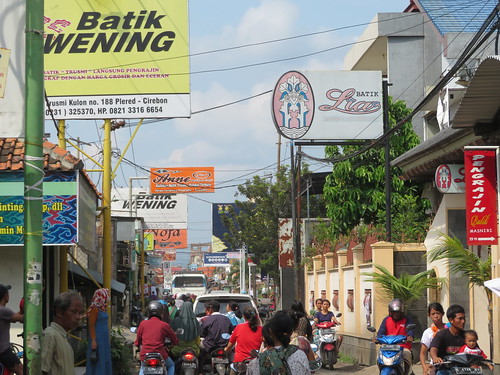
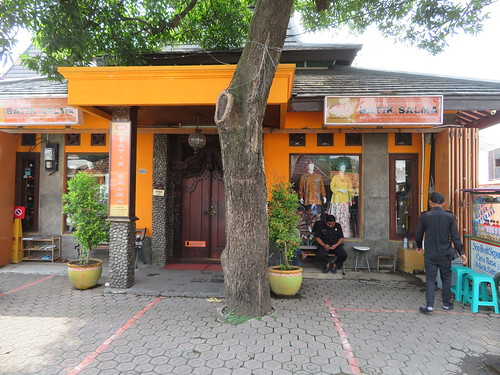
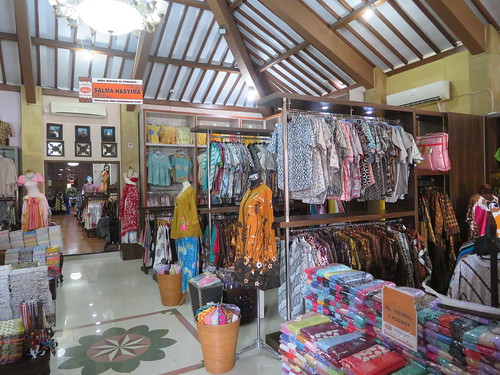
ITC and other indoor market style malls
ITC has a few places around Jakarta (and maybe other areas), and they're very handy for a wide variety of clothing, especially if your interest is cheaper but still reasonable quality stuff.
I buy most of my work shirts from a stall in their BSD centre.
This is ITC, BSD (or at least some of the clothing sections).
You'll notice most are market stall style but they have the advantage of an indoor air conditioned area.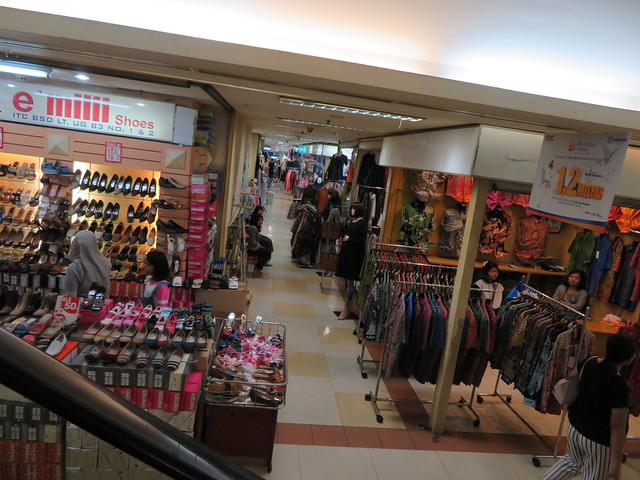


There are many malls of this type around Indonesia and the close collection of small businesses means you can find a large variety of styles easily.
Tailored clothes
There are many top end clothing shops in Indonesia, Pronto being a fine example of such a place. Shops such as this have a wide variety of materials available and are able to make pretty much anything you want in whatever top quality materials you desire.
Ladies and gents fashions are taken to a whole new level at their shop in Bintaro sector 9.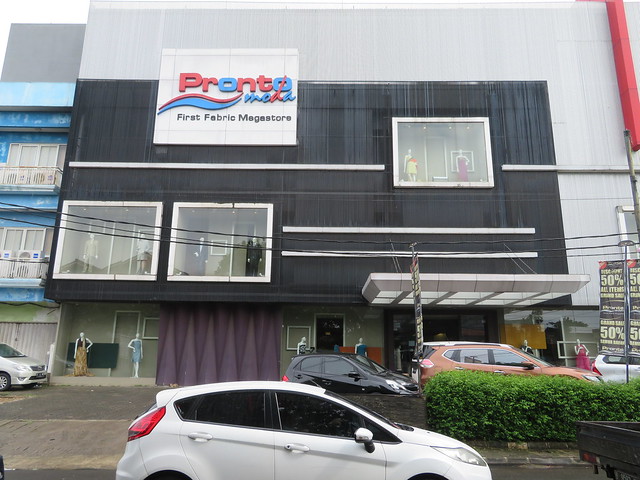


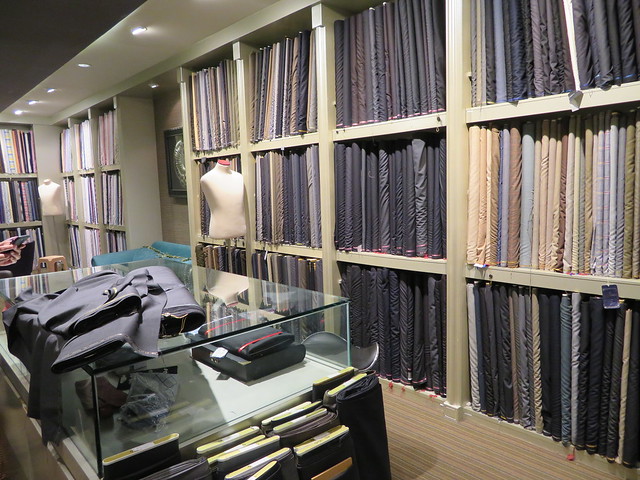
Pictures with kind permission of the management. Thank you.
More tailored clothes
Many small tailors are dotted around the streets but they vary in quality a lot. I sometimes use these places to make up a shirt from material I have been gifted.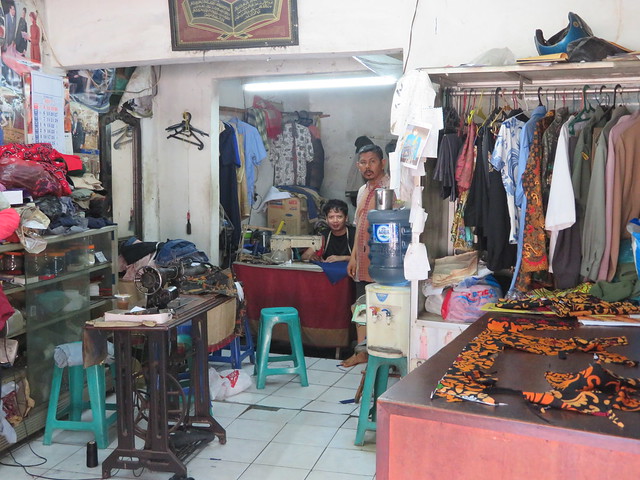
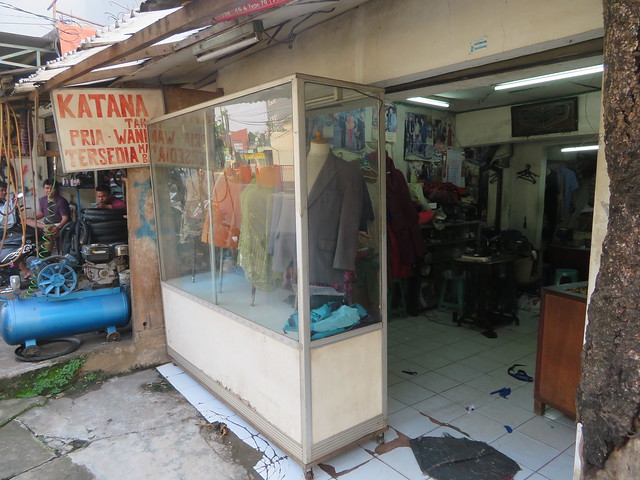
Shoes
Shoes for most westerners are available in the cites, sandals are everywhere, but those of us with very large or wide feet can have a problem. My feet are unusually wide and I have serious issues finding shoes (I did in the UK as well), but some of the open back shoes will fit.
Large and wide fitting trainers are easier to find if you live in a city or larger town.
Men with larger feet can have problems over here, but there's hope.
I found a chain store that stocks shoe sizes up to Ero 46, yes, 46 as standard stock, and in unusually wide fittings.
The one pictured below is in Aeon mall, Serpong but they have many shops and several other shops stock their products.
Articles to help you in your expat project in Indonesia
 Working in Bali
Working in BaliThe multi-faceted island of Bali offers many opportunities for those who wish to move from tourist to ...
 Driving in Indonesia
Driving in IndonesiaTraffic in Indonesia can be very overwhelming, particularly since the discipline and road conditions can ...
 Having a baby in Indonesia
Having a baby in IndonesiaIf you are about to have a baby in Indonesia, you should be aware that the medical services available to pregnant ...
 Moving to Indonesia with your pet
Moving to Indonesia with your petMoving to Indonesia with a pet is not a risk-free operation, mainly due to stray animals and rabies. ...
 Accommodation in Bali
Accommodation in BaliIf you are planning to relocate to Bali, housing is a critical part of your project. So how to find your ...
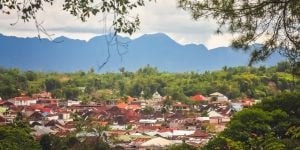 Accommodation in Indonesia
Accommodation in IndonesiaMany of the expatriates living in Indonesia prefer renting accommodation owing to the generally limited ...
 Buying property in Bali
Buying property in BaliShould your experience as an expatriate in Bali make you want to settle down permanently, you might want ...
 Internships in Indonesia
Internships in IndonesiaDo you wish to acquire hands-on experience, gain new professional skills and expand your international ...
Find more topics on the Indonesia forum














